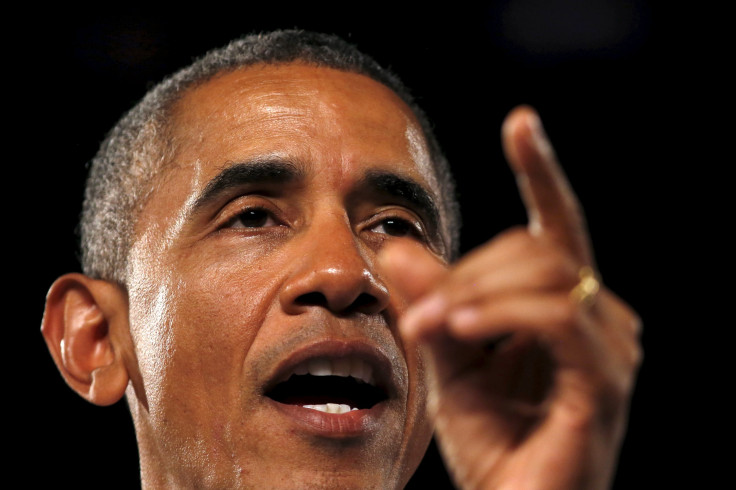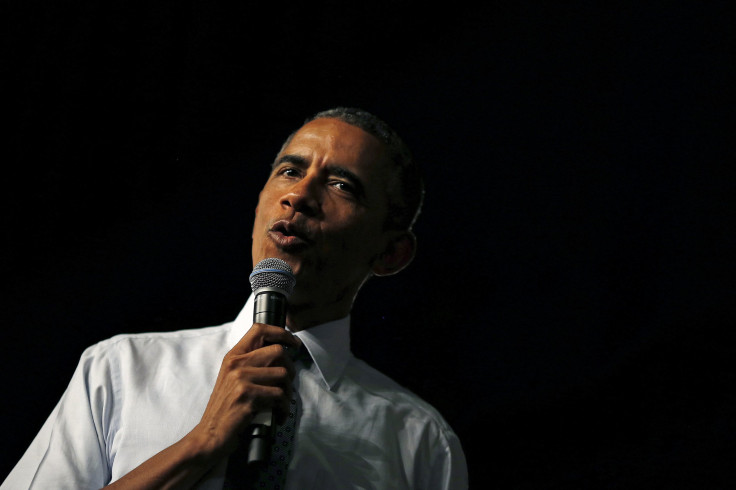Obama Pushes Repeal Of Carried Interest Tax Loophole Ahead Of Looming Budget Showdown With Congressional Republicans

Congress should be feeling a sense of urgency to come to an agreement and pass a workable federal budget in the next two weeks, U.S. President Barack Obama said Wednesday morning during a meeting of business leaders in Washington, D.C. If they can't do it, the country may face another government shutdown, which in the past has cost billions of dollars and rocked consumer and investor confidence.
In his speech to Business Roundtable, a group of CEOs of leading American companies engaged in public policy, the president spoke steadily and soberly while renewing a call for bipartisan work to repeal the carried interest tax loophole that has allowed wealthy investors to pay lower interest than average Americans. While Obama did so, he criticized Republicans in Congress for "playing chicken" with the federal budget because of the GOP's opposition to federal funding for Planned Parenthood, which consumes a tiny fraction of the $18 trillion federal budget.
President Obama remarks @BizRoundtable – LIVE online here: http://t.co/XnweXhZp3G pic.twitter.com/ppsEi7xMDM
— CSPAN (@cspan) September 16, 2015
"My hope is that Congress aims a little higher than just not shutting the government down. It’s a good start, [but] we’d like them to achieve better," Obama said, mentioning that sequester relief, or relief from top-line, non-discriminating federal budget cuts, is set to expire in the next few weeks. Further sequester relief would boost the economy and create jobs, he added. "If we don't reverse the cuts that are currently in place, a lot of the drivers of growth that your businesses depend on" will disappear.
A federal shutdown would follow the one in October 2013, when the federal government was shut down for a little more than two weeks and all federal employees aside from those deemed the most essential were told to stay home. That shutdown was precipitated by the ongoing feud over funding for the implementation of the Affordable Care Act, a major legislative victory for Obama that requires health insurance coverage and created federally subsidized marketplaces to shop for and find care plans.
This year's budget battle has two main points of contention. The one being pushed by the president is the controversial carried interest tax loophole, which allows hedge fund managers to be taxed at a rate lower than ordinary income earners' rate. The other, which is propped up by the GOP, is funding for Planned Parenthood, which has been thrust again under national scrutiny following the release of a video by an anti-abortion group that showed a Planned Parenthood employee discussing the sale of fetal tissue after abortions in a candid way while eating a salad at lunch. Planned Parenthood has disputed the integrity of the video and characterized the edits to the original footage as misleading.
The carried interest tax loophole works by effectively treating the share of profits that hedge fund managers receive from investments as a long term capital gain, which is taxed at a lower rate than regular income from straight forward labor as opposed to investment. The idea for capital gains tax breaks in general is that maxing out the tax rate for those investments at 20 percent instead of the max of 39.6 percent is an incentive to invest money in long term and more risky ventures -- say, starting a small business.
Opponents of the carried interest tax loophole point out that the individuals benefiting from the tax break are the wealthiest people in the country and are using other people's money to accrue more wealth; some point out that by working with someone else's money the hedge fund managers are effectively just doing their jobs -- not undertaking large personal risk -- and income from that should be taxed in the same way that average labor income is.
"I will tell you that keeping this tax loophole -- which leads to folks who are doing very well paying lower rates than their secretaries -- is not in any demonstrable way improving our economy," Obama said Wednesday. "On the other hand, if we closed the loophole, we could double the workers' in America’s job training programs. We could help another $4 million students afford college."
Obama wants to use the revenue increase to pay for domestic and national security programs.

This isn't the first time Obama has criticized carried interest. He had some choice words in 2007 regarding the tax-rate disparity, but his focus on the issue has been increasingly pointed in the past year. Income inequality is an increasingly hot political issue, and policies that seem to exacerbate wealth disparity are key targets.
"The top 25 hedge fund managers made more than all the kindergarten teachers in the country. So when I say that, I’m not saying that because I dislike hedge fund managers or I think they’re evil,” Obama said in May. “If we can’t ask from society’s lottery winners to make that modest investment, then really this conversation is for show.”
Obama's support from the financial services industry, gauged by comparing campaign donations given his first presidential run versus those given to his second, has dropped significantly since he took office. For the 2008 election, he raised $16.5 million from workers and PACs associated with the industry, making it his fourth-largest donor base. In 2012, that support had dropped to eighth most important, and just $6.8 million was given to his campaign, according to data from the Center for Responsive Politics. The finance, insurance and real estate industries more broadly heavily favor Republicans seeking federal office. In the 2014 cycle, the industries donated just over $507 million, and 62 percent of that cash went to GOP candidates, according to CRP data.
Distaste with the carried interest tax loophole isn't only a Democratic talking point, however. At least two 2016 Republican hopefuls, real estate mogul and front-runner Donald Trump and former Florida Gov. Jeb Bush, have come out opposing the loophole and endorsing a repeal.
Follow me on Twitter @ClarkMindock
© Copyright IBTimes 2025. All rights reserved.





















